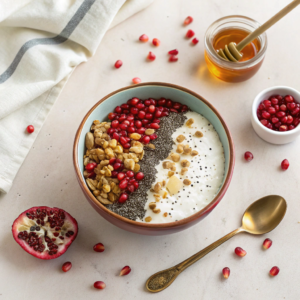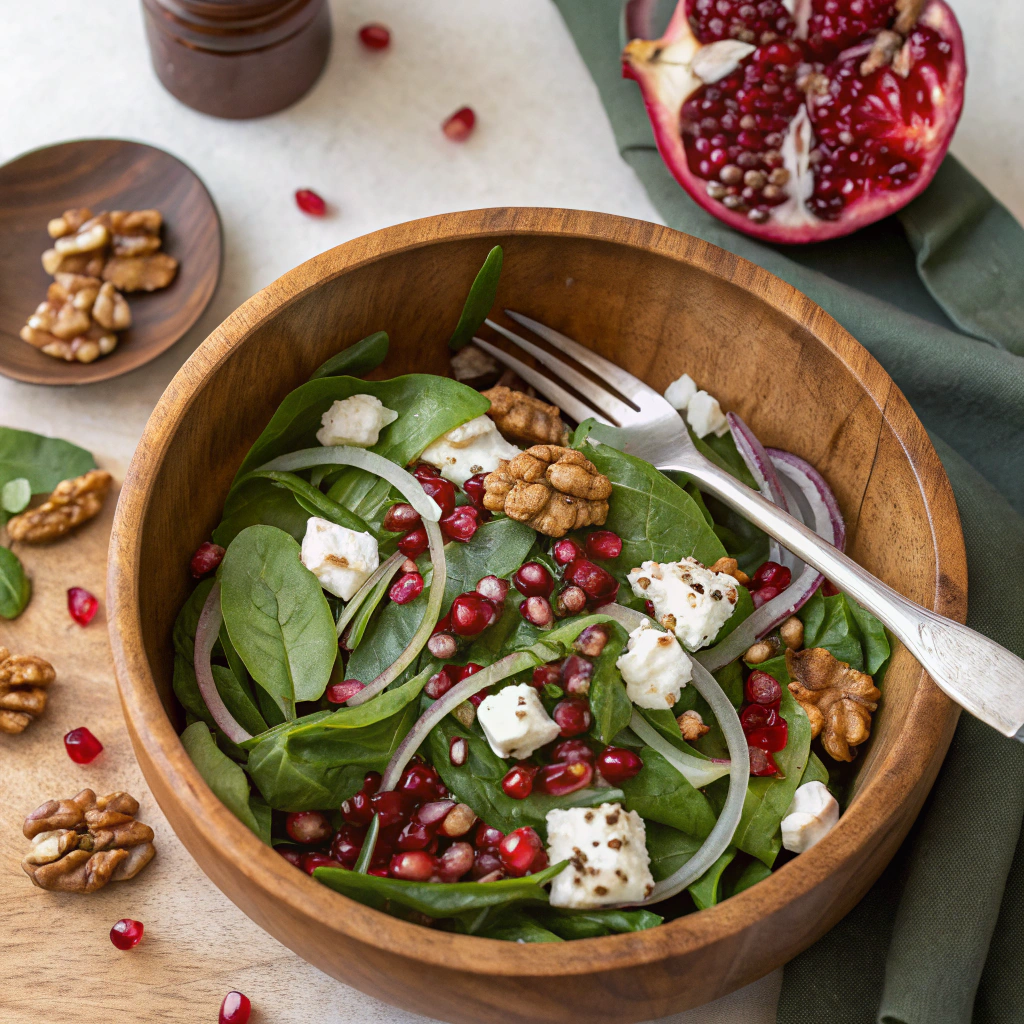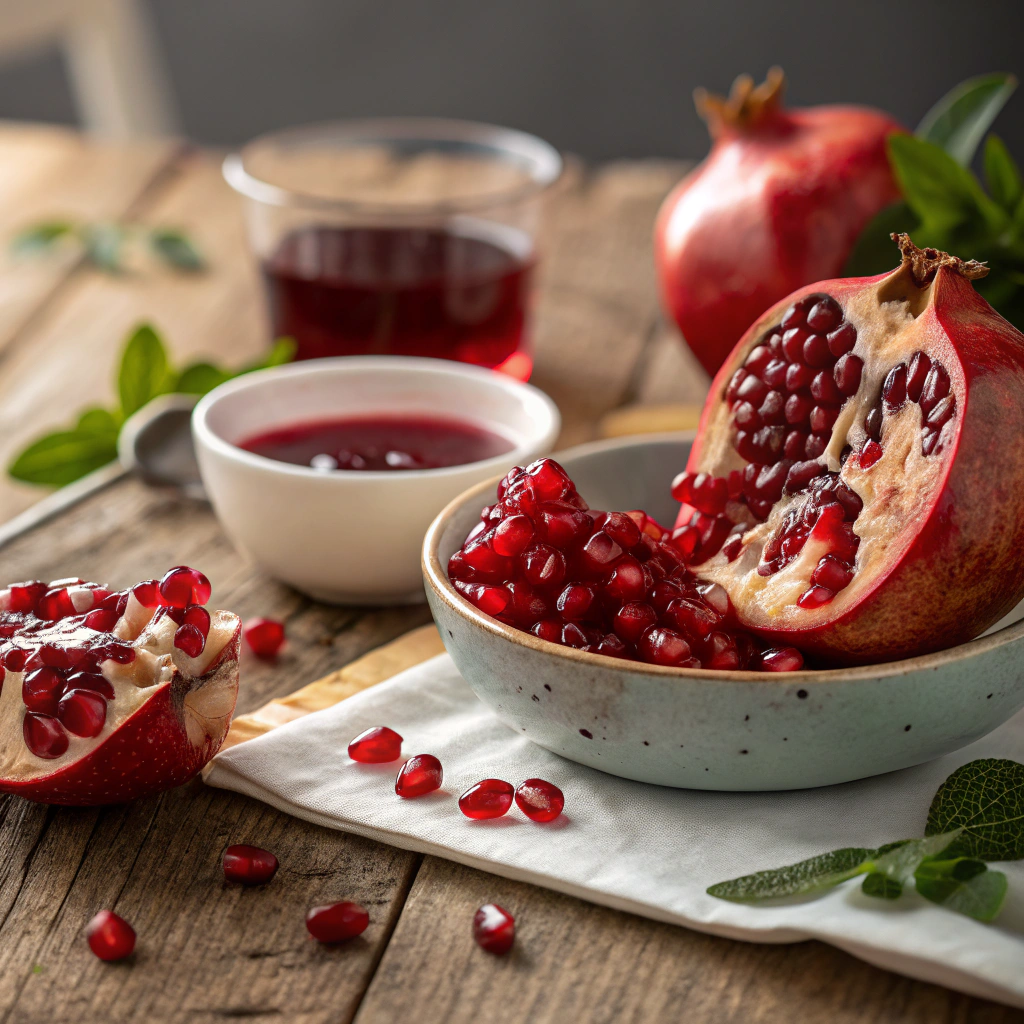Granada fruit, which goes by the common name pomegranate, is famous for its sweet-tangy flavor and ruby-red seeds. Today, this ancient fruit continues to be the subject of scientific research.
Traditionally, granada fruit was used to boost wellness by modern medicine for its antioxidant properties, and now we know that it has them for a reason. In short, if you want to improve your wellness, fruit should definitely be part of your diet.
Rich Source of Antioxidants
Granada fruit is well-known as an exceptional source of antioxidants. The jewel-like arils also contain polyphenols like punicalagins and anthocyanins, which further enhance their antioxidant capacity.
These protective compounds can shield the body from reactive oxygen species (free radicals) and other oxidative stress blunt force substances that incur harmful damage to cells and contribute to a multitude of degenerative diseases.
- Punicalagins, unique to granada fruit, are particularly powerful and have been found to be more potent than antioxidants found in other foods like green tea and red wine.
- Furthermore, the vibrant red hue of granada fruit is due to anthocyanins, another class of powerful antioxidants that promote healthy aging as well as cell restorative functions.
Thus, consuming fruit on a regular basis will help combat oxidative stress which is a leading factor in inflammation and aging. NIH (National Institute of Health) has also shown that the juice of granada decreases oxidative stress markers in the blood, showing a decreased risk for some diseases.
Adding fruit in your diet as whole seeds, or juice, and including them in smoothies makes it effortless to bolster defenses against stressors over time.
Enhances Cardiovascular Wellness
The cardiovascular benefits of fruit are among the most extensively investigated. Its rich antioxidant content aids in promoting circulation and reducing blood flow and other factors linked to heart disease.
- Granada fruit may help decrease blood pressure because of its natural punicic acid content.
- Harvard University has shown that the consumption of juices derived from grenada aids in reducing LDL cholesterol (bad cholesterol) oxidation, thus providing support in maintaining healthy arteries.
Granada fruit also aids in preventing arterial inflammation which preserves the flexibility and openness of blood vessels aiding in good blood circulation.
Maintaining these habits can be very helpful for people with a family history of heart problems.
Add granada juice to smoothies or drink it fresh for additional heart benefits. Adding other fruits and vegetables improves cardiovascular protection even more.

Enhances Immune Function
Pomegranate provides a bolstering benefit for the immune system. The granada fruit is a good source of vitamin C, K, folate and other micronutrients that strengthen the immune system. A single pomegranate can actually provide nearly 30% of the daily vitamin C requirement for an adult.
- Vitamin C is one of the essential vitamins for the body, especially for white blood cells as it enhances their activity during infections.
- Folate and vitamin K have important roles in tissue repair, cell regeneration and growth, which are critical to supporting immunity during a cold or flu season.
Pomegranates also have natural antibacterial and antiviral activity. Its extract has been historically used for sore throat and upper respiratory infections.
Additionally, the fiber in granada fruit also promotes a healthy gut, which is vital for immune system control. The regular intake of fruit seeds supports the proliferation of beneficial gut microorganisms, which enhances immune function and general health.
Improves Digestive Health
Pomegranate and primarily its seeds, is also one of the best sources of dietary fiber for digestive health.
- Just one serving of granada fruit seeds offers a staggering 7 grams of fiber. This makes up almost 25% of the daily recommended value.
- As with many other helpful dietary fibers, their consumption granada fruit helps keep bowel movements regular, decreasing problems such as constipation.
In contrast, granada fruit provides certain polyphenols that function as prebiotics. These compounds feed and help sustain some beneficial microbiota in the intestines which aid in microbiome homeostasis and nutrient assimilation.
If you have any form of digestive discomfort, try fruit sprinkled in your salads, breakfast bowls, or even yogurt. It’s an excellent source of yummy food to up fiber intake while assisting in maintaining a balanced gut.
May Help Inflammation and Chronic Conditions
Chronic inflammation is a concealed factor behind an array of health problems from joint pain, through metabolic syndrome, and even some forms of diabetes. Such anti-inflammatory properties can be fruit’s unique compounds that stand out as an additional tool for supporting best practices dealing with controlling inflammation.
- Punicalagin in granada fruit has also been shown to inhibit certain inflammatory processes within the body.
- Clinical studies, some of which are cited by the Mayo Clinic, show that fruit extract has potential to lower the inflammation markers in patients suffering from arthritis and inflammatory bowel disease.
Additionally, people who consume granada fruits have shown better results for those who are likely to develop metabolic syndrome and type 2 diabetes. Notably, the fruit’s polyphenols moderate blood sugar responses for the better, diminishing spikes after meals, and boosting insulin sensitivity.
For individuals trying to manage any chronic inflammation, granada fruits adds flavor while helping fight inflammation and serving as a great source of dietary nutrients.
Yummy Granada Fruit Recipe: Granada Refreshing Salad
Showcase granada’s taste and nutrition in your meals. This nutritious and easy Refreshing Granada Salad is sure to be a hit with everybody.
Ingredients
- -1 pomegranate
- 2 cups fresh baby spinach
- -1 cup arugula
- -1/4 cup crumbled fetta cheese
- -1/2 cup chopped cucumber
- 1/4 cup walnuts or pecans lightly toasted
- 1 small red onion thinly sliced
- 1 pomegranate’s half seeds
- 2 tblsp extra virgin olive oil
- 1 tblsp balsamic vinega
- Salt and freshly ground black pepper to taste
Instructions
- Slice granada fruit in halves. Half each will be tapped at the bottom so that seeds can be released into the bowl.
- In a large salad bowl, mix the baby spinach with arugula, sliced cucumber, and red onion.
- To the mixture, incorporate crumbled feta and either walnuts or pecans that have been toasted.
- Garnish with freshly sliced granada fruit seeds for colorful bursts and flavor.
- For the dressing, combine olive oil and balsamic vinegar and whisk in a small bowl. Add salt and pepper for taste.
- Drizzle dressing on top of salad, then toss gently to combine all ingredients.
- For the best flavor, serve right away.
Notes

Preparation Method
- Slice granada fruit in halves. Half each will be tapped at the bottom so that seeds can be released into the bowl.
- In a large salad bowl, mix the baby spinach with arugula, sliced cucumber, and red onion.
- To the mixture, incorporate crumbled feta and either walnuts or pecans that have been toasted.
- Garnish with freshly sliced granada fruit seeds for colorful bursts and flavor.
- For the dressing, combine olive oil and balsamic vinegar and whisk in a small bowl. Add salt and pepper for taste.
- Drizzle dressing on top of salad, then toss gently to combine all ingredients.
- For the best flavor, serve right away.
Tips:
- For additional protein, add grilled chicken, shrimp, or chickpeas.
- Mix in more fruits like segments of oranges for a zesty addition.
This dish is excellent to have on the side or as a light lunch because it contains antioxidants, vitamins, and healthy fats.
Additional Wellness Advantages of Granada Fruit
In addition to the main health benefits already noted, granada fruit has several other advantages.
- Combats aging: Vitamin C and antioxidants help produce collagen which supports skin and decreases wrinkles.
- Assists in losing weight: Granada fruit has low calories and high fiber, making it helpful in feeling full, assisting in weight loss.
Possible memory enhancement: The polyphenols in granada fruit might improve cognitive function and protect against age-related memory decline, as suggested by studies conducted at National Institutes of Health.
Granada fruit can help promote health span and enhance one’s vitality and resilience if enjoyed regularly, as part of a balanced diet.
Love Pomegranates? Try These Handy Products !
To make it easier for you to enjoy all the amazing health benefits of pomegranates (granada fruit), we’ve rounded up some of our favorite products. Full disclosure: We’re part of the Amazon Associates program, so we earn a small commission if you purchase through these links—at no extra cost to you! This helps support our work to bring you great wellness content.
1️⃣ For Heart Health: Skip the messy squeezing and try POM Wonderful 100% Pure Pomegranate Juice packed with antioxidants and ready to drink!
2️⃣ Easy Prep: Deseeding pomegranates is a breeze with the OXO Pomegranate Tool saves time and keeps your kitchen clean.
3️⃣ Daily Boost: Can’t eat fresh pomegranates often? These Pomegranate Extract Capsules deliver the same anti-inflammatory benefits in one simple dose.
4️⃣ Glowing Skin: Pamper yourself with Kate Blanc’s Pomegranate Seed Oil a natural way to hydrate and brighten your complexion.
5️⃣ Recipe Inspiration: Discover 50+ creative ways to use pomegranates in The Pomegranate Cookbook perfect for meals, drinks, and desserts!
We only recommend products we genuinely believe in. Thank you for supporting our mission to share the power of superfoods like pomegranates !
Granada Fruit Dietary Suggestions
Adding granada fruit to your kitchen pantry can be simple. The sweet-tart taste of granada fruit and its crunchy seeds make it a suitable addition to both sweet and savory dishes. Here are a few easy suggestions to help you kick off.
- Add a colorful and nutrient-dense breakfast by adding seeds to yogurt, oatmeal, or cottage cheese.
- Add granada fruit to smoothies with bananas, berries, or leafy greens.
- Use as toppings for avocado toast or grain bowls.
- Use granada fruit juice in homemade salad dressings and marinades to add a tangy twist.
- Add seeds into parfaits or desserts to enhance the flavor and texture.
Looking for different ways to use granada fruit through the week can simplify meal preparation while effortlessly enhancing nutrition.

Pomegranate provides a bolstering benefit for the immune system. The granada fruit is a good source of vitamin C, K, folate, and other micronutrients that strengthen the immune system. For more immune-boosting fruits, explore nature’s secret to a strong immune system with these white fruits .
Conclusion
The granada fruit stands out as one of nature’s most exceptional superfruits in the case of health and wellness as it possesses an abundant combination of viatmins, anti-inflammatory elements, and antioxidants. Improved heart and immune functions, enhanced digestion and skin health, and many more benefits can be enjoyed if the granada fruit is incorporated into your routine. Adding granada fruit to one’s diet is easy thanks to many creative recipes and effortless serving suggestions. Including this nutrient-rich fruit in your diet, supports long-term health as well as active and vibrant living.
To broaden your knowledge regarding the advantages of granada fruit, rely on primary sources such as NIH, Harvard University, and the Mayo Clinic.
This exceptional fruit has the potential to transform your health and wellness journey, so explore the various ways it can enrich your life.
